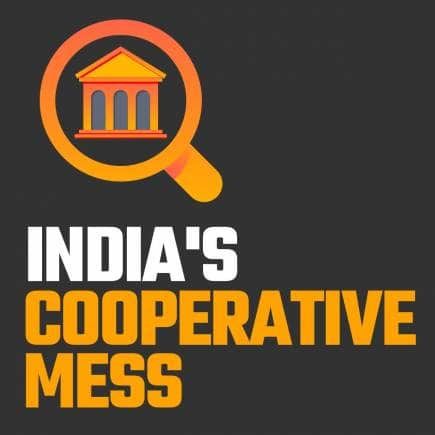



Depositors of scam-hit Karavannur Cooperative Bank are a shattered lot. Mostly working-class people who had their life savings parked in the Kerala-based lender, they are scrambling to meet their daily needs and other expenses like medical emergencies.
The depositor distress was highlighted when 70-year-old retired government nurse, Philomina Devassy, died due to a lack of specialised treatment following an infection in her eye and brain. Devassy reportedly had her life savings of Rs 28 lakh with Karavannur Cooperative Bank, which she could not access, the deceased’s family has alleged. Devassy’s relatives staged a protest in front of the bank on July 27 with her dead body, according to media reports.
Devassy is not the only victim; there are multiple others. For instance, 57-year-old Sunitha, an unmarried housemaid who reportedly goes by only one name, had saved Rs 1.5 lakh in the bank. All her money is now stuck, while she struggles to fend for her ailing parents.
Also read: Explainer| Why Kerala is upset with the RBI on regulation of cooperative banksWhat is the scam?Once a trusted, prominent bank in Kerala, Karavannur Cooperative Bank has been in the news for all the wrong reasons. The bank was controlled by the Left parties and has party members on its administrative panel.
In July last year, the bank was hit by an estimated Rs 100-crore scam by pledging properties to draw fresh loans without the knowledge of its original owners. An audit by the Joint Registrar of Cooperative Societies in 2019 found that a group of the bank’s officials and board members, and some individuals belonging to the local real estate mafia used these property documents as collateral to illegally borrow funds.
Loans were drawn using the same property documents already pledged in the bank and using fake signatures and letterheads. The police booked six bank employees, including administrative members, for colluding with the real estate mafia to divert funds. A police case was registered, but little progress has been made so far. Following reports of depositor distress, the issue has snowballed into a political battle between the ruling party and the opposition.

Currently, the bank is under an administrator. The Kerala High Court on Tuesday reportedly directed the bank to stop all payments to depositors, barring those for emergency purposes. It also directed the government to chalk out a roadmap toward repaying depositors.
During the course of the hearing, the bank told the court that at present it had only Rs 60 lakh in cash but had assets that could be sold and depositors can be paid. It also pointed out that of the total deposit of Rs 284 crore, a sum of Rs 142 crore has matured, reported IANS.
Vulnerable depositorsIn India, cooperative banks play a crucial role in rural financing. They provide a much-needed alternative to the practice of people approaching the village moneylender, which invariably gets them into a debt-trap they struggle to pull themselves out of. The aim was to promote saving and investment habits among people, especially in rural areas. But those objectives are, many times, subverted.
“More often than not, cooperative banks are informally termed as ‘the bank of those in power’, being set up and run by groups of people with vested interests,” said Namita Shah, co-founder of Presolv360, an online dispute resolution firm. “In the past, governance and regulation imposed upon cooperative banks was far less compared to their private or public sector counterparts. This led to the creation of multiple cooperative banks that are a front for misappropriation of funds, and the unsuspecting public went ahead and poured in their savings in such banks.”
That has proven true given that when these banks came under the Reserve Bank of India’s (RBI) radar, and regulatory compliances were made stringent, various scams came to light. But the depositor remains vulnerable.
“As a depositor, unfortunately, today, there isn’t much that is available by way of remedy, if savings are stuck in such a bank, except for withdrawing the permissible limit (specific to each case),” added Presolv360’s Shah.
The issue of depositors’ money being stuck in failed or tainted cooperative banks is not new. A total of 27 small cooperative banks were liquidated in the past five years, while 42 cooperative banks were closed on account of mergers during this period, minister of state for finance Bhagwat Karad informed Parliament on July 26. During FY22, a total of 11 cooperative banks were shut on account of mergers as against none in the year before that.
Where is the regulator?Initially, cooperative banks were governed by both the RBI and the Registrar of Cooperative Societies, resulting in regulatory and supervisory lapses, thus, in turn, resulting in several frauds. There isn’t a fool-proof audit system either. To address the issue of dual regulation, the Banking Regulation (Amendment) Act, 2020, was passed, which gave the RBI the powers to regulate cooperative banks more efficiently.
The RBI has been tightening its scrutiny of cooperative banks over the last few years. More recently, it has begun penalising cooperative banks for violating rules so that any irregularity can be clamped down on at an early stage, without much torment to depositors. However, there are many gaps to be filled, said, experts.
Also read: RBI penalises two co-operative banks for rule violations“Primarily, lack of accountability, audits and a robust system of procedures and systems along with internal checks and controls led to a delay in the detection of fraud and occurrence of fraud,” said Avinash Kumar Khard, partner at DSK Legal. “Several cooperative banks do not have policies in place for fraud risk management. Overall risk management and credit monitoring systems are thus found to be inadequate and insufficient.”
More recently in 2021, the Deposit Insurance and Credit Guarantee Corporation (DICGC) was empowered to make a deposit insurance payouts to troubled banks. The bank is required to pay an insurance premium to the DICGC. Funds up to Rs 5 lakh are stipulated to be provided to an account holder within 90 days of the bank coming under a moratorium imposed by the RBI.
“Often, the insurance amount is rendered useless in times of emergency, especially medical-related ones,” said an official of a depositor union of an erstwhile cooperative bank, requesting anonymity. “The depositor psychology is so vulnerable right from the time a moratorium is imposed on a bank. The first thought is, ‘The bank will collapse, where will I go?’ That is the most helpless feeling.”
DSK Legal’s Khard explained that even though the DICGC provisions are in place, it has not instilled significant confidence in depositors affected by the cap on withdrawals. There is no express provision for a lump-sum withdrawal by the depositor in case of emergencies, he said.
What can depositors do?According to legal experts, depositors need to be careful while parking their life savings in a bank. Ideally, they must avoid depositing all their money in one bank account, they said.
“Except for claiming the insurance amount from DICGC in certain cases, there is no effective legal remedy available with depositors which enables them to withdraw their life savings if a cooperative bank fails or is under the radar,” added Khard. “If the RBI puts a cap on withdrawals, the depositor must follow the directions issued by the regulator.”
Sonam Chandwani, the managing partner at KS Legal, concurred with Khard’s view.
“The remedies available under Indian law are restricted to police complaints, consumer redressal and resorting to the (banking) ombudsman’s aid. However, none of the current remedies can be availed to withdraw the depositor’s sum if the bank is under the radar,” Chandwani said.
“In the current situation, such remedies lack the required legal instruments and machinery to safeguard depositors,” she added.
(This is the first in a series highlighting the plight of depositors in India’s failed cooperative banks.)Discover the latest Business News, Sensex, and Nifty updates. Obtain Personal Finance insights, tax queries, and expert opinions on Moneycontrol or download the Moneycontrol App to stay updated!
Find the best of Al News in one place, specially curated for you every weekend.
Stay on top of the latest tech trends and biggest startup news.